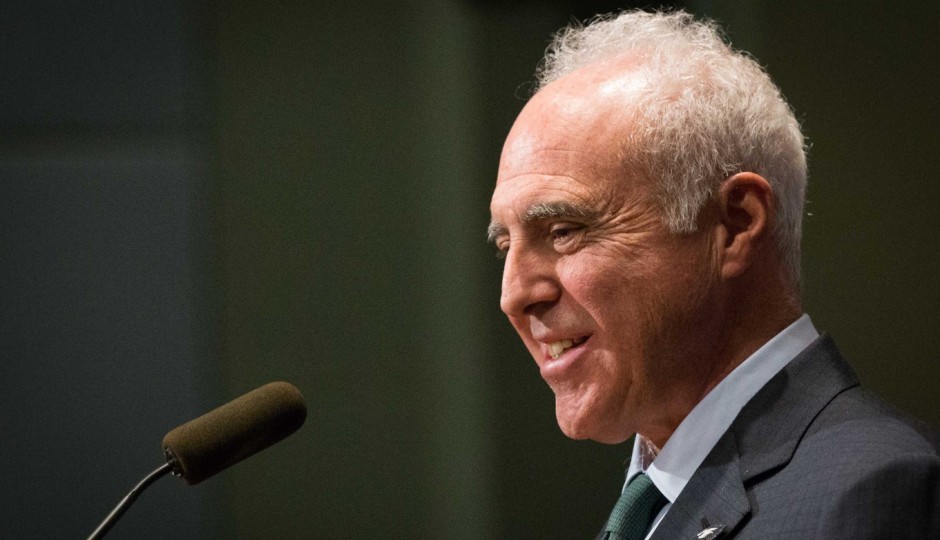Eagles Wake-Up Call: Lurie On Changing Times

Jeffrey Lurie. (USA Today Sports)
BOCA RATON, FL — Jeffrey Lurie was surely aware of the criticism, and even if he somehow eluded it, reporters directly asked him about it yesterday at the NFL’s annual meeting.
If your plan all along was to give Howie Roseman back the power he once had, why not be transparent about it from the start, say the new personnel executive wouldn’t be hired until after the draft and re-assign Roseman the General Manager title?
“In today’s NFL, I don’t know what the words ‘general’ and ‘manager’ mean,” Lurie responded. “So we’re trying to be a little more specific and say ‘football operations,’ because when you’re managing football operations, it’s no longer about watching tape, figuring out who to draft and that kind of stuff. It’s extraordinary collaborative. It’s information intensive.”
Roseman’s title is Executive Vice President of Football Operations, and according to Lurie, it’s reflective of the changing times. The Eagles’ owner emphasized that studying film will always be the core of what the head of the personnel department does, but that the peripheral duties evolve and “information processing” is now a critical element of that.
“When you’re talking the NFL today and football operations, it’s really a very fast-moving field, if you understand where we’re at,” Lurie said. “We’re not at where [we were] when I bought the team 20 years ago, or where the league was 10 years ago. If there’s two positions that have to process information and data quickly and completely, it’s quarterback and it’s head of football operations.”
Lurie cited how, in May, NFL teams will receive data from RFID technology — radio frequency identification — that will “revolutionize the sport in the long run” through live, biometric measurements that track player movements on the field. He also mentioned how important he thinks incorporating statistics into scouting is, as well as integrating sports science with “peak performance.”
“There’s no easy and correct way, but I think teams that can take advantage of the information have a huge leg up,” Lurie said.
According to the owner, Roseman is the perfect man for the job. Lurie labeled Roseman’s offseason moves so far as “outstanding,” and opined that Roseman has returned to the head of the personnel department smarter, humbler and, of course, more collaborative.
“The whole plan was for Howie to really spend the time [last year] studying state-of-the-art decision-making around the globe in sports and we really opened it up from English Premier League, NHL, NBA, MLB,” Lurie said. “Try to find who the best general managers or, quote, ‘head of basketball operations,’ were, make sure that Howie was able to spend a lot of time with all these people — I spent some time with some of them — and really kind of take that year and learn from the best in terms of where they’re usually open about their successes and their mistakes and where they got lucky, and just take it all in.”
WHAT YOU MISSED
Tim examines the relationship between Howie Roseman and Jeffrey Lurie through the lens of accountability.
We recap the rules changes adopted yesterday at the owners meetings.
Tim rounds up the most interesting tidbits from yesterday’s AFC coaches breakfast.
“I was all for [the Kiko Alonso/Byron Maxwell trade], because I know this: one guy is not going to change our team, so adding three starters for us is a big deal.” More from the Eagles’ recent trade partners.
Tim details how the new coaching regime is a fresh start for Lurie in yesterday’s wake-up call.
WHAT THEY’RE SAYING
The Inquirer’s Jeff McLane wonders why it took so long for Jeffrey Lurie to acknowledge Howie Roseman’s power this offseason.
A year ago at the owners meetings, Lurie spoke glowingly of Kelly, and in explaining his decision to give the coach final say, said the impetus was to go from “good to great.” It was done to “let him be responsible for all the decisions he wanted to inject and make.”
It could be argued that Lurie set Kelly up to fail by keeping Roseman in the building. It hindered the search for a personnel head because many in the league viewed the Eagles front office as a contentious one, and it suggested that Lurie wasn’t all-in on Kelly.
Clearly, he wasn’t. He fired him after a one-year experiment, despite 26 wins in three seasons. Roseman, meanwhile, spent the year in exile searching the globe for “state of the art decision making” just in case (wink-wink) Kelly imploded.
Philly Voice’s Jimmy Kempski cautions against the Eagles against dealing Ryan Mathews.
The Eagles got “value” in the form of moving up 13 spots in the fourth round by trading Murray, but the real value was in getting rid of Murray’s terrible contract. Because Mathews has a far more palatable contract and was clearly a more effective runner last season, the Eagles probably could have gotten a better return for Mathews, although still likely not a whole lot.
Losing Mathews at this point would leave the cupboard bare at running back, so trading him wouldn’t make much sense, despite reports to the contrary. The Eagles could certainly change their mind depending on what direction they go in the draft.
COMING UP
Chip Kelly addresses the Philadelphia media for the first time since being fired, and Doug Pederson sits down with reporters for an hour.
Asher Dark contributed to this post.